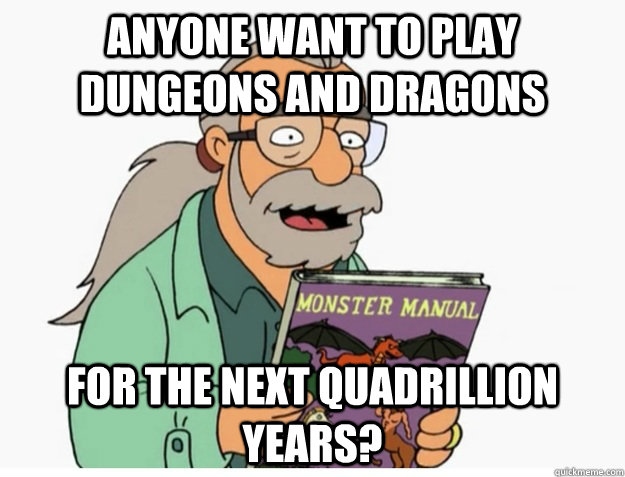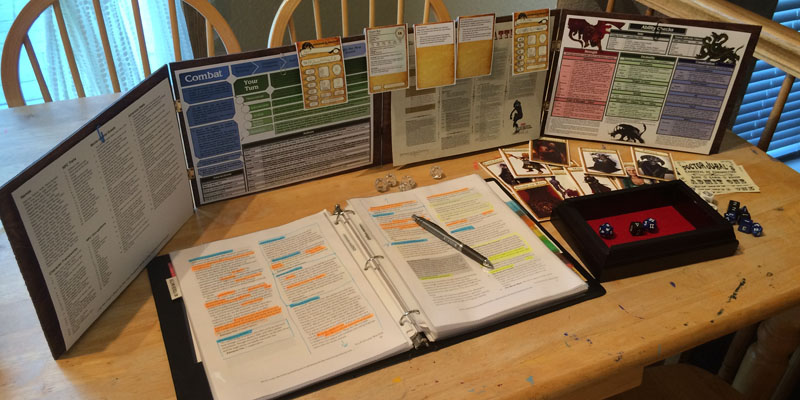Remember back in the mists of time when you were just learning to play a game, hunched over a table at your Friendly Local Game Store? Trying to absorb the reams of information your friend was pouring into your brain? When you didn’t know what a con save was, or a bluff check, or a dump stat? Maybe this is the first time you had ever learned that dice came with more than six sides, or that there was more than one LOTR-type elf.

Remember when the know-it-all world-weary grognard ambled by and told you everything your friend was telling you was wrong and there is Only One True Way/Edition/Faction? Remember the crushing look of defeat on your friend’s face, and how that one person soured your affection towards the game?
Remember when you really, really wished you could jump in the TARDIS, distract yourself with a phone call, take your own place at the table, and tell that person to take a flying leap into the Pit of Despair?
That happened to some people near and dear to me this week – and someone needs to bring this up, so we as a community can stop this travesty from happening. New players are the lifeblood of our culture, and we have GOT to stop inflicting our own pet peeves and biases on new people, so they can enjoy developing their own.

Here’s a brief checklist of how not to be *That* Gamer:
Point the First: If you see someone explaining a game to someone else, and the party of the second part looks confused – mind your own damn business. Let the person doing the explaining do the talking, unless you know them. In that case, ASK IF YOU CAN HELP. Do not, repeat, do not, just assume that everyone wants to hear your opinions.
The one caveat to this follows: If it is a game you love, if there is a natural break in the conversation (Point the Second will address this), you can politely say “Oh, you’re talking about Warbling Mongooses! I love that game! It’s really fun. Welcome to the community. I’m *Name*. Let me know if you’d like a game or if you have any questions.” Then walk away unless invited to comment more – but wait for the invitation.
And for the love of spice, remember to introduce yourself. There’s nothing worse than being approached by a random person that you will likely run into again, but you can only remember them as “that guy in the Metroid T-shirt” or “that lady with the purple hair”.

Point the Second: Do not interrupt someone explaining a game to a new person, particularly if your interruption involves some obscure bit of trivia that is not relevant. This creates a lot of confusion and, frankly, makes you look like an ass.
Example: “Oh, Warbling Mongooses? You know, in the second errata of the third edition, they ruled that female mongooses can only warble in the contralto register on the second Thursday of a month without an R in it.”
If there is a natural lull in the conversation, you can politely (that word again, I know) ask if you can contribute something to the explanation. Be prepared to accept “no” as an answer.
“Hey, I heard you guys talking about Warbling Mongooses. New player? That’s great. You’re lucky to be starting now, the rules are so much simpler after the second edition – no more twelve hour game sessions! After you’ve learned the basics, let me know if you’d like to play a game or two. Always glad to meet new people.”
Be positive or be silent.

Point the Third: So, the grizzled veteran (GV) and the eager young convert (EYC) are sitting at the FLGS table, playing a hand of Warbling Mongooses – and the new person looks like they are getting the hang of it. DO NOT walk up to the table and start pointing out how the new person (or the veteran, for that matter) are playing it wrong.
WRONG:
GV: Plays a contralto Warbler during a half-moon phase.
EYC: Plays a contratenor Warbler during the same half-moon phase (illegal move).
You: (as GV is opening their mouth to correct their student) Oh hey, you can’t play that, it’s the wrong phase. Contratenors can only be played during waxing crescent. You shouldn’t be playing contratenors anyway. Mezzosopranos are so much better! I’ve got a wicked Mezzosoprano deck that just beats faces all day long. Oh, by the way, if you play that baritone in the next move and follow it up with a second tenor, you’ll win in the next turn.

RIGHT:
GV: Plays a contralto Warbler during a half-moon phase.
EYC: Plays a contratenor Warbler during the same half-moon phase (illegal move).
You: *silence*
GV: No, wait, you can’t play that during this phase. See the moon phase icon on the card? You have to match that to the indicator on the table.
EYC: Oh, right. Yeah. My bad.
*Game continues*
Most people learn best from one source at a time. If you aren’t that source, wait until you are asked for assistance or a natural break in the game to add a comment. No one likes to be told how to win – part of the joy of gaming is figuring out your own win conditions.
Point the Fourth: So the EYC has become a convert to Warbling Mongooses, and you see them playing with their GV mentor. They are doing okay but still making some mistakes, maybe not playing with an optimal deck. You are at your FLGS and see them playing. You approach the table, and:
“Dude, that deck sucks, and contratenors are always weak against basses and contraltos. You should be playing mezzosopranos and second bass against that match up. Have you seen my deck? I’ve put like $1,000 and ten years into my deck! It kicks so much ass! Make this play and this play and this play and you’ll win right now.” *
*Change the subject of the sentence (sub a particular faction of minis in a popular war game in for the Mongooses) and this is a faithful transcription of what I heard. I wish I was exaggerating.
Shut up. Shut up right now. Do not pass go, do not collect $200, and do not use your love for a hobby as a brandishing weapon about how much disposable income and free time you have. Go home and rethink your life if you think this kind of behavior is even marginally acceptable.
Repeat after me: Everyone was new once. Everyone was new once. Everyone was new once.
Instead, after the game is over, you can walk up to the table, introduce yourself, and offer to help.
“Hey, I’m *Name*. Saw you were playing Mongooses and having a little bit of trouble – that was a tough match. I’ve been playing for forever and I might have some extra cards that could help you out. Interested?”
Again, be prepared to accept “no, thank you” as an answer. Sometimes people don’t want help. It’s not your place to ram it down their throats. That being said, I have never seen a sincere offer turned down. Often, the new player will ask the person making the offer for advice or suggestions. Voila, there’s a bit of camaraderie to add to the community. Good for you. You get a gold star and/or a cookie.
For new players that tend to be a bit on the defensive side (like me): This is the time where you get to mind your manners as well. If someone is legitimately offering to help you, not trying to wave their more-gamer-than-thou card in your face, the least you can do is give them a polite answer.

Point the Fifth: Thou shalt not condemn anyone’s choice of faction – or means of choosing a faction – especially when they are just getting started! There’s no faster way to crush a tendril of interest than to be told everything they find intriguing is bad or stupid.
We’ve all heard of the, poorly named, “girlfriend method” – where the person picks their faction (or equivalent, say, their Commander for M:tG) based on what they think is pretty.
There’s not a damn thing wrong with this. In fact, my gaming mentor specifically mentions this method to all people he introduces to his gaming drug of choice. It’s simple logic: you’re going to have to be looking at them while you are playing them, so you might as well choose something you find aesthetically pleasing.
Most people get into a game by choosing a faction they loved (or one that was handed to them), using it to learn the game, and then upgrading to a “stronger” faction when/if they decide to become a more competitive player. For example, I learned to play Commander using a prebuilt 2013 Commander deck that I would never willingly choose to play again. Now I’ve built my own and I love it, despite its flaws.
They may never progress beyond a casual player, but they at least will enjoy looking at the models/cards they have chosen. If they ask for advice, and they might, especially if their mentor/teacher shows that your opinion is worth listening to – then you can provide your opinions in a constructive way. “I really love playing contraltos/sopranos, because I love tricksy combos, but if you want a more aggressive, straightforward deck, you might want to look at…”
No one, and I mean no one, decides to walk into a game store and become a world-champion player of anything the first time they play it. Let the neophytes choose their doom in whatever manner they choose. It’s no skin off your nose.
Bonus Point the Sixth: Compliment a game well played, or a clever play, or a well-painted miniature, or a cool playmat. Say something nice to a new player; don’t cross the creeper line. When you are meeting a new player for the first time, be friendly, offer a compliment, but nothing you wouldn’t say to a stranger on the street.

For those of you in the socially awkward demographic, an example:
“That’s an awesome *insert fandom* T-shirt/hat/lanyard/patch!” “That’s a really pretty playmat!” “I haven’t seen that variant of that model before – that’s cool!”
These are okay. Any comments on a gamer’s appearance that you wouldn’t say in front of a judge are NOT okay. Just keep that simple rule in mind and you’ll likely stay out of trouble.
Also, as a side note: remember and respect personal space. You’re at a FLGS, not squeezed on a Tokyo subway. Give people room to breathe and to not feel like you are cornering them or pinning them against a table. Be aware of your presence.
I know this sounds like a lot of “mind your own business”, and that sounds antisocial. It’s not, really. You want new players to feel comfortable in your gaming locale of choice, and it can be intimidating as hell to be in an unfamiliar place surrounded by strangers. If that new player walks into a store to laughter and people having fun, gets greeted by smiles and open acceptance – well, a good first impression works wonders, as they say.
Remember, everyone was new once. We should always be open to inviting new people into our hobbies and our gaming dens – and we need to police our own. If an LGS isn’t welcoming to new players, or tolerates behavior that ostracizes players, vote with your feet and your dollars and go somewhere else. We are all responsible for our community and the members within it.
May all your 20’s be natural,
Georgia
Georgia is a writer, editor, gamer, and mad culinary priestess who masquerades as a courier and personal cook while her plans for world domination slowly come together. She lives in Tacoma, Washington, with her husband and Feline Overlords. She can be reached through Facebook at In Exquisite Detail or on Twitter at @feraldruidftw.